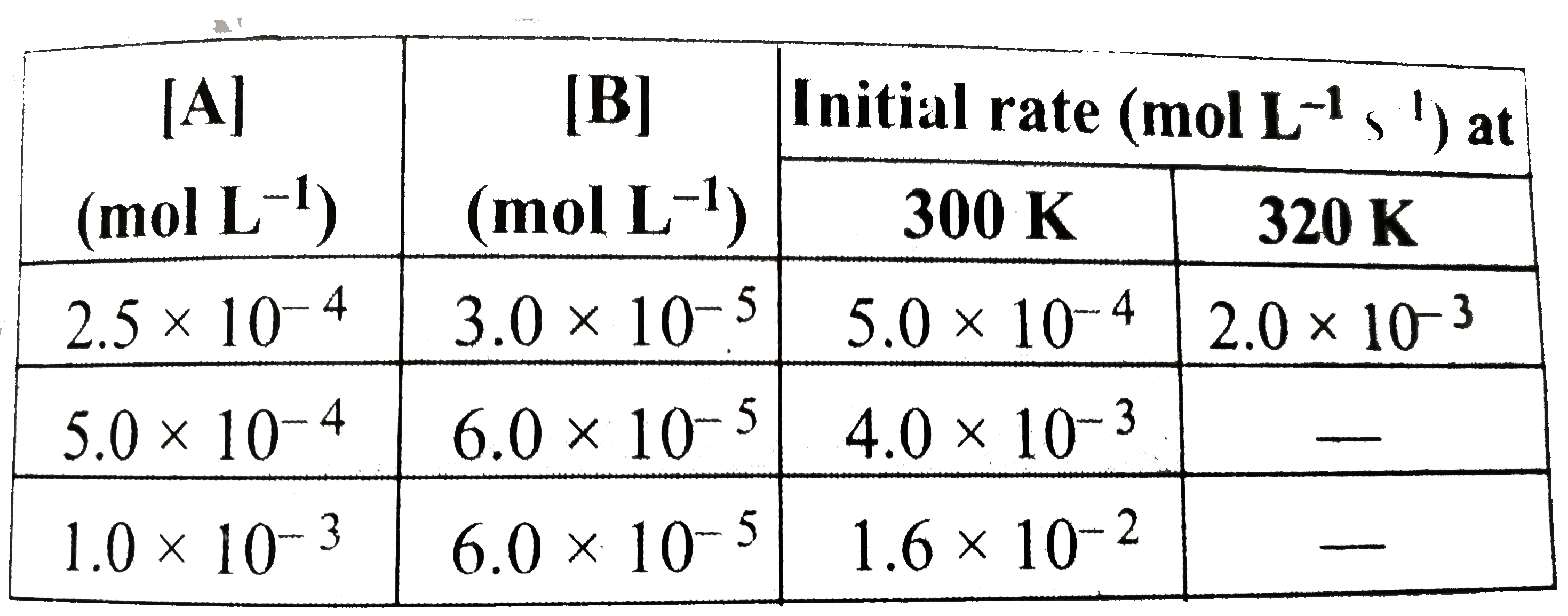The rate constant of a reaction becomes equal to the pre exponential factor when:
the absolute temperature is zero
the activation energy is infinity
the absolute temperature is infinity
the activation energy is zero
The correct Answer is:C
To determine when the rate constant (k) of a reaction becomes equal to the pre-exponential factor (A), we can use the Arrhenius equation, which is given by:
k=Ae−EaRT
where:
- k is the rate constant,
- A is the pre-exponential factor,
- Ea is the activation energy,
- R is the universal gas constant, and
- T is the absolute temperature.
1. Understand the Arrhenius Equation: The equation shows that the rate constant k depends on the pre-exponential factor A, the activation energy Ea, the universal gas constant R, and the temperature T.
2. Set k Equal to A: We want to find the condition under which k=A. Substituting this into the Arrhenius equation gives:
A=Ae−EaRT
3. Simplify the Equation: We can divide both sides by A (assuming A≠0):
1=e−EaRT
4. Determine When the Exponential Equals One: The exponential function equals 1 when its exponent is zero:
−EaRT=0
5. Solve for Conditions: This implies:
EaRT=0
Since R is a constant, the only way for this fraction to be zero is if Ea=0 or T approaches infinity.
6. Analyze the Conditions:
- If Ea=0, it suggests that there is no activation energy required for the reaction, which is not realistic for most reactions.
- If T approaches infinity, the term EaRT approaches zero, making the exponential term equal to 1.
7. Conclusion: Therefore, the rate constant k becomes equal to the pre-exponential factor A when the absolute temperature T approaches infinity.
Final Answer:
The rate constant of a reaction becomes equal to the pre-exponential factor when the absolute temperature is infinite.
- k is the rate constant,
- A is the pre-exponential factor,
- Ea is the activation energy,
- R is the universal gas constant, and
- T is the absolute temperature.
- If Ea=0, it suggests that there is no activation energy required for the reaction, which is not realistic for most reactions.
- If T approaches infinity, the term EaRT approaches zero, making the exponential term equal to 1.
The rate constant of a reaction becomes equal to the pre-exponential factor when the absolute temperature is infinite.
Topper's Solved these Questions
- CHEMICAL KINETICSBOOK - CBSE COMPLEMENTARY MATERIALCHAPTER - CHEMICAL KINETICSEXERCISE - VERY SHORT ANSWER TYPE QUESTIONS
24 Videos
- CHEMICAL KINETICSBOOK - CBSE COMPLEMENTARY MATERIALCHAPTER - CHEMICAL KINETICSEXERCISE - SHORT ANSWER-I TYPE QUESTIONS
26 Videos
- BIOMOLECULESBOOK - CBSE COMPLEMENTARY MATERIALCHAPTER - BIOMOLECULESEXERCISE - SHORT ANSWER-II TYPE QUESTION
13 Videos
- CHEMISTRY IN EVERYDAY LIFEBOOK - CBSE COMPLEMENTARY MATERIALCHAPTER - CHEMISTRY IN EVERYDAY LIFEEXERCISE - LONG ANSWER TYPE QUESTIONS
2 Videos
Similar Questions
form the following data for the reaction between A and B,

(a) Calculate the order of the reaction with respect to A and with respect to B.
(b) Calculate the rate constant at 300K.
( c) Calculate the pre-expontential factor.
View SolutionThe rate constant for a first order reaction becomes six times when the temperature is raised from 350 to 400 K. Calculate the energy of activation for the reactions.
View Solution
Knowledge Check
The rate constant of a reaction will be equal to the pre-exponential factor when
ATemperature in centigrade is zero.BThe absolute temperature is zero.CThe absolute temperature is infinity.DNo suitable answer.The rate constant of a reaction changes when
Aa catalyst is addedBconcentrations of the reactant are changedCtemperature of changedDboth (a) and (c )The rate constant of a reaction is equal to the rate of reaction when
AConcentration of all reactants are unityBConcentration of all reactants and products are equalCConcentration of reactants and products do not change with timeDThe reaction takes infinite time for completion
The rate of chemical reaction are strongly affected by temperature . Arrhenius (1889) gave following relation between rate contant and temperature .
k=Ae−Ea/RT .....(i)
This equation is called Arrhenius equation. The constant 'A' is caleld Arrhenius of pre-exponential factor. Logarithm of equation (i) given :
log10k=log10AEa2.3030RT .....(ii)
The rate constant for a reaction is .
log10sec−1=14−1.25×104KT .....(iii)
At what temperature, rate constant of the reaction is equal to the pre-exponenntial factor ?
View SolutionThe rate constant of a reaction is equal to rate of reaction
View SolutionThe rate constant for a first order reaction is equal to the initial rate of reaction when the initial concentration of the reactant is
View SolutionIn the Arrhenius eqution k=Ae−Ea/RT , the rate constant (k) becomes equal to the Arrhenius constant (A), when :
View SolutionThe rate constant (K') of one reaction is double the rate constant (K'') of another reaction. Then the relationship between the corresponding activation energies of the two reactions (Ea'andEa'') will be -
(Assume the pre-exponential factor & temperature to be same)
View Solution
